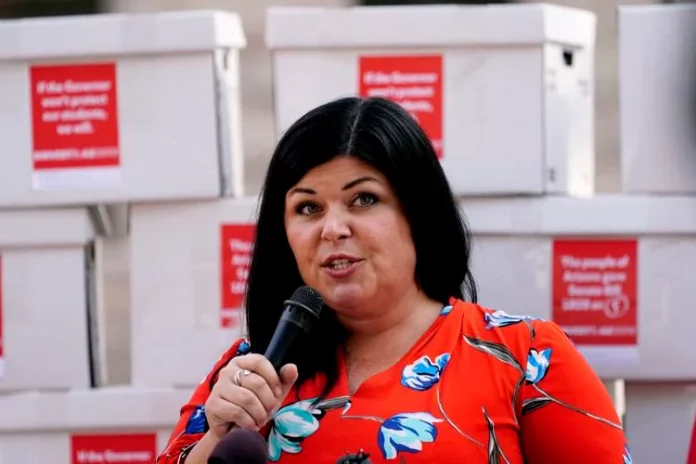A massive expansion of Arizona’s private school voucher system will likely go into effect after public school advocates failed to gather enough signatures to block the law, a conservative think tank that supports the expansion said Monday.
The Goldwater Institute, a conservative and libertarian public policy think tank in Phoenix, said Save Our Schools Arizona “submitted just 88,866 signatures, according to petition sheets made available by the Secretary of State’s office.” That’s “significantly short of the requisite 118,843 signatures needed to overturn the reform via ballot referendum.”
Although Save Our Schools Arizona said they “will await accurate numbers” from the Secretary of State’s office regarding their challenge to the law, the head of the grassroots group acknowledged they are probably well below the threshold.
“Obviously, we are incredibly disappointed with the numbers,” said Beth Lewis, executive director of Save Our Schools Arizona, in a phone interview.
Monday’s developments appear to be a major victory for “school choice” advocates in Arizona and across the nation who argue that parents should be able to use public tax dollars to send their children to schools that best serve their needs. Voucher opponents say they drain money from long-underfunded public schools that serve the vast majority of children, sending public money to unaccountable private and religious schools and mainly benefitting the wealthy.
Lewis pushed back on criticism from voucher backers, who had said the group intentionally overstated the number of signatures collected by volunteers across the state to block the law, signed by Republican Gov. Doug Ducey in July. When the group turned in boxes of petitions on Friday, Lewis estimated they had nearly 142,000 signatures, above what was needed to block the law until voters could weigh in.
“It’s just really a devastating blow to public education today,” Lewis said. “We’ll obviously honor the results that the Secretary of State’s office comes up with, and go from there.”
Victor Riches, president and CEO of the Goldwater Institute, said “the preliminary results make it clear: Arizona families have rejected special interests’ attempts to take away their ability to choose the education that best meets their child’s unique needs.”
The Secretary of State’s office has not formally completed its review. Even if the group came in above the needed number, supporters of the voucher program had vowed legal action to challenge the signatures.
Save Our Schools Arizona formed when teachers, parents, and other public school advocates came together after the legislature passed a similar expansion in 2017. Voters overwhelmingly rejected the change in 2018.
The new law would have taken effect last Saturday, but was temporarily halted as Save Our Schools filed its signatures. If enough signatures had been gathered, the law would have stayed blocked until the next general election in 2024.
Although about a third of Arizona students qualify for the existing voucher program — mainly those living in low-income areas with failing schools — only about 12,000 students statewide currently use the system.
The new law will let every parent in Arizona take public money now sent to the K-12 public school system and use it to pay for their children’s private school tuition, homeschool materials, or other education costs.
Arizona already has the most expansive education options in the nation and will have the most comprehensive voucher system if the law takes effect.
An estimated 60,000 currently-enrolled private school students and about 38,000 homeschooled students would immediately be eligible for up to $7,000 per year, although a small number already get vouchers.
All 1.1 million students who attend traditional district and charter schools would also qualify to leave their public schools and receive money to attend private schools.
Lewis and other opponents of the program say they worry that as much as $1 billion could be lost from the public school system funding. K-12 schools currently get about $8 billion a year in state funding.
Republished with the permission of The Associated Press.















